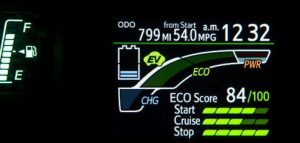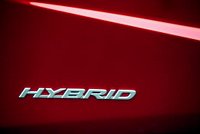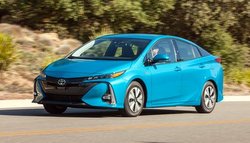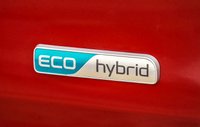Hybrid Driving Techniques-Squeezing More Miles Out of Each Gallon
More than likely, you purchased a hybrid vehicle to save money at the pump and have a positive impact on the environment. Most hybrids are off to a pretty good start as far as saving gas is concerned, but owners of underachieving hybrids get upset with their dealers or the carmakers, while many other owners of the same hybrid are able to get spectacular results by putting a little thought and consideration into their driving habits.
Over the years many automotive journalists, including myself, have said that a specific hybrid “drives like a regular gas-powered car.” While that is generally true, unlike standard vehicles, hybrids often require slightly different driving techniques to extract the best miles per gallon. We’re not talking about driving as if Miss Daisy were sitting in the backseat, but the driver is the key to great fuel mileage—drivers control the car, not the other way around.
With that in mind, here are some hybrid driving techniques and tips that will validate your decision to buy a hybrid for great fuel mileage, regardless of which brand you are driving.
Getting Started

Before you rush out and begin driving to see if you can increase your fuel economy, there’s something you should do first—read the owner’s manual. That may seem boring, but the auto manufacturer knows the best methods for the best mpg for its hybrid vehicles, and the owner’s manual will have a fuel economy driving tips section.
Now that you have the owner’s manual open, find the section that explains the various information that shows up on the hybrid’s display screen in the instrument cluster and/or navigation screen. Understanding what they mean will help you improve the vehicle’s fuel efficiency by letting you know how much energy is being used.
Accelerating From Stop and Cruising On City Streets
Something that trips up many hybrid drivers is their excitement to use only battery power, so they drive too slowly from a stop. While it may seem counter-intuitive if you are trying to conserve fuel, it is actually more beneficial to move briskly from rest. That’s because pulling away uses more energy than cruising, and doing so in all-electric movement means you are wasting electricity that can be put to better use while cruising.
Instead, accelerate using the gas engine, and then momentarily lift off the accelerator pedal when the car reaches a speed of around 35-40 mph. This will activate the EV mode—usually indicated by a dashboard light—and at this point you can gently apply pressure to the pedal to keep the vehicle driving all-electric for a considerable distance.

There are few perfectly flat city or urban streets and the vehicle will need to engage the gasoline engine for power. But with practice you can increase speed to the 35-40 mph mark, lift, and then gently apply pressure to the pedal to continue driving with electric power only. Hybrids get their best fuel economy while driving in town and this technique will vastly improve your city fuel economy.
These hybrid driving techniques work to good effect whether your hybrid is equipped with a continuously-variable transmission (CVT) like Toyota or Ford models or on vehicles with a standard transmission, such as BMWs, Hyundais and Kias.
Reading City Traffic and Braking
The best hybrid fuel economy results are achieved when the car is in electric mode. You can ensure the hybrid battery pack has enough electrons by reading traffic, then coasting and using gentle braking when you know there is a red light or stop sign ahead. Hybrid cars employ regenerative braking systems that capture the car’s kinetic energy when coasting or braking lightly to recharge the battery pack.
Highway Driving

Unless you are an aerodynamics engineer, you won’t understand how much more energy it takes to push a car through the air at 75 mph compared to 65 mph, but it’s huge. In other words, slow down a bit. When you are driving on an incline, it’s OK to lose a few mph. If it is really steep, turn the air conditioner off. When you head down the other side, if your hybrid has a transmission position that increases regenerative braking, use it. It will not only slow the vehicle down it will double or triple the amount of electricity sent to the hybrid battery.
If your current driving habits include frequent on and off the accelerator, that type of throttle control kills fuel mileage. Instead, use cruise control. A smooth, steady accelerator pressure is more fuel efficient, regardless of the speeds you travel.
Several hybrid cars will operate in electric mode at highway speeds up to 75 mph on fairly flat roads and when traveling downhill. If yours does, after a little practice you will learn when to gently massage the throttle and get the most electric-only driving.
ECO Mode
Most hybrid vehicles have an ECO mode button, which should be used often in city driving or once up to speed on the highway. This technology lessens throttle response as well as alters air conditioning and accessory settings so they draw less power.
EV Mode
Some hybrids, though not all, can run in fully electric mode up to a certain speed or under certain conditions. The best use of the EV mode is in parking lots when searching for a parking space or a short in-town trip of two miles or less. Ideally, keeping the batteries above 50-percent charge extends the distance you can run on battery power, saving fuel. Using the EV mode quickly drains the battery.

Accessory Use
In the heat of summer, set the air conditioning temperature to the highest setting that keeps you comfortable, and don’t use the maximum setting after the cabin has cooled down.
If your hybrid doesn’t have daytime running lights, avoid using the headlights during sunlit daytime hours. Newer hybrid models are switching to low-energy LEDs, but older models are usually equipped with halogen bulbs that use more current and therefore use more power.
Your Fuel Mileage May Still Vary

Even though these driving techniques and tips will increase your hybrid’s fuel economy, often quite considerably, there will be times when you will experience a decline in fuel mileage. For example, if you drive in a hilly or mountainous terrain, expect fuel economy to drop as much as 5-7 mpg. Or, if you believe you need to get somewhere quickly, well, there goes the fuel economy.
Also, if you live in a part of the country that has definite summer and winter seasons and frequently drive the same route, you’ll find that your fuel economy will decrease in the winter. That’s because the car needs to warm up before the hybrid system can kick in, meaning that it will operate with the gas engine for a period of time.
But remember, you control the car, and that means you control the fuel economy.
Happy motoring.
Related Stories You Might Enjoy:
Road Test: 2017 Nissan Rogue
All-Wheel Drive Cars with the Best MPG
Road Test: 2017 Kia Optima Hybrid
First Drive: 2017 Kia Niro Hybrid
Road Test: 2017 Lexus CT 200h
Top 10 Best-Selling High-MPG Cars of 2016
Road Test: 2016 Toyota Prius Liftback

Wow! This is very awesome. Thank you for this information. Great post! @Ayees
Great tips. I drive a Honda Accord Hybrid and my wife drives a Kia Niro, and these tips apply nicely to both. On the HAH, I drive in B mode to get more regen. Overall we’re getting 50 MPG on average.
@Rick,
Well done. Great to hear our ideas validated and expanded in the real world. –ed.